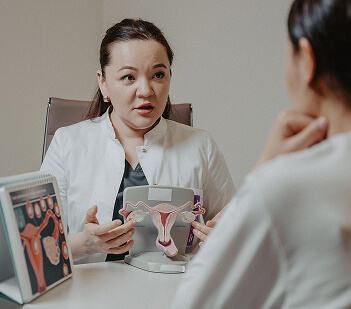Artificial insemination (AI) is a procedure in which sperm is introduced into a woman’s reproductive tract using medical intervention. This is one of the ways that can help a couple become parents. The International Center for Reproduction NGC performs artificial insemination, providing the highest possible chances for successful conception and the birth of a healthy child. This procedure is carried out if the examination has not revealed any abnormalities in the woman’s reproductive health – the ovaries are functioning normally, the fallopian tubes are completely passable and healthy, the uterus is without pathologies.
Indications for artificial insemination
Ovulatory dysfunction.
Ejaculatory-sexual disorders in the partner.
Subfertile sperm.
Vaginismus.
Undetected infertility factor.
Contraindications to artificial insemination
· Obstruction of both fallopian tubes.
· Somatic and mental illnesses that contraindicate pregnancy.
· Malformations and pathologies of the uterus that may interfere with pregnancy.
· Malignant neoplasms.
· Severe pathospermia in the partner.
How is artificial insemination performed?
1. Preparation. The process begins with a preparatory stage, which includes medical examinations to ensure there are no contraindications and to assess the patient’s fertility. In some cases, medications may be prescribed to stimulate ovulation.
2. Sperm collection and preparation. Before injection, the sperm is processed to increase the concentration of motile sperm and improve the chances of fertilization.
3. Ovulation Monitoring: The exact time of ovulation is determined using ultrasound monitoring or ovulation tests. Timing is critical, as artificial insemination must be synchronized with ovulation to increase the chances of conception.
4. Insemination Procedure: During the procedure, sperm is injected directly into the patient’s uterus using a thin catheter. It is a quick and painless process.
5. Recovery: Following artificial insemination, the woman is advised to rest for a short period of time and then resume her normal activities.
6. Pregnancy Test: A pregnancy test will be taken two weeks after the procedure.
The effectiveness of artificial insemination depends on many factors, including the woman’s age, the cause of infertility, and the quality of the sperm. In some cases, the procedure may need to be repeated several times to achieve the desired result.
Benefits of contacting the international fertility center NGC Almaty
Expertise and experience. Experience and knowledge play a key role in the process of artificial insemination. NGC specialists have extensive experience in the field of reproductive medicine. Their professionalism and understanding of the medical aspects of this procedure allow them to create individualized treatment plans for each patient, maximizing the chances of successful conception.
Personalized approach. Our team pays special attention to the health characteristics and individual needs of each person. We strive to create a comfortable and supportive environment where patients feel safe.
Modern equipment and technology. At NGC, we use advanced medical equipment and modern technology to carry out artificial insemination procedures. This allows us to ensure high accuracy and efficiency of the process.
Benefits of artificial insemination
· Solving infertility problems. Artificial insemination is a reliable way to solve this problem and achieve the desired pregnancy.
· Increasing the chances of pregnancy. Artificial insemination increases the likelihood of successful conception.
· Choice of donor material. In certain cases, where your own material is not suitable for use, there is an option to choose donor material, which gives additional chances for successful conception and birth of a healthy child.
Artificial insemination at NGC is not just a procedure, it is a path to parenthood and the realization of the dream of a family. Our goal is to provide patients with the highest level of medical care, creating a safe and supportive environment for them to realize their cherished dream. Contact the international reproduction center NGC today and start your path to happiness.


